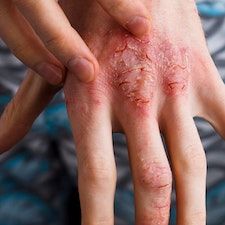Article
Study Identifies Two Groups of Children at Higher Risk of Developing Asthma
Author(s):
Recent research has identified two groups as high risk for developing asthma, with one noted as having early eczema and the other not having the skin condition.

One group with early eczema, found to be sensitized to food allergens, and another without early eczema, found to be more likely to be polysensitized to aeroallergens, were found to have a higher risk of asthma, according to recent research.
The analysis was designed to examine the impact of ciliary gene KIF3A risk allele rs12186803. The study was led by Elisabet Johansson, PhD, from the Department of Pediatrics at the University of Cincinnati’s Division of Asthma Research.
The study tested the researchers’ hypothesis that eczema and allergic sensitization could act separately or be affected by one another, noting that the effects of these sensitizations could be affected then by underlying KIF3A genetic variation.
“Two high-risk groups were identified: one with and one without early eczema,” Johansson and colleagues wrote. “The high-risk group with early eczema was more likely to be sensitized to food allergens, while the group without early eczema was more likely to be polysensitized to aeroallergens.”
Background
The investigators collected data on 505 study participants from the Cincinnati Childhood Allergy and Air Pollution Study (CCAAPS), which examined food allergen and aeroallergen sensitization in addition to longitudinal asthma and eczema outcomes.
They defined early eczema for participants as having a diagnosis by age 1, 2 or 3 years-old. The research team determined pulmonary function of the participants at age 7, and used ATS/ERS guidelines for asthma diagnosis determination.
In order to test their hypothesis, the investigators began by assessing the dynamic between the patterns and timing of allergic sensitization and eczema, while exploring asthma risk for the study participants. Following this assessment, they examined whether KIF3A genetic variation affected these kinds of relationships.
Findings
The study results indicated that the KIF3A rs12186803 risk allele affected participants’ food sensitization by raising risk of developing asthma for children diagnosed with eczema (P = 0.02). The investigators also noted that asthma had an association with the interaction of aeroallergen sensitization and rs12186803 (P = 0.007) for children with no eczema.
“KIF3A interacted differentially with sensitization pattern to increase the risk of asthma in two high-risk groups of children with and without early eczema,” they wrote. “Given the reported role of KIF3A in epithelial cell functioning, the results add evidence to the hypothesis that an impaired epithelial barrier is a key aspect in the development of allergic disease.”
The study, “Identification of two early life eczema and non-eczema phenotypes with high risk for asthma development,” was published online through Wiley Online Library.





